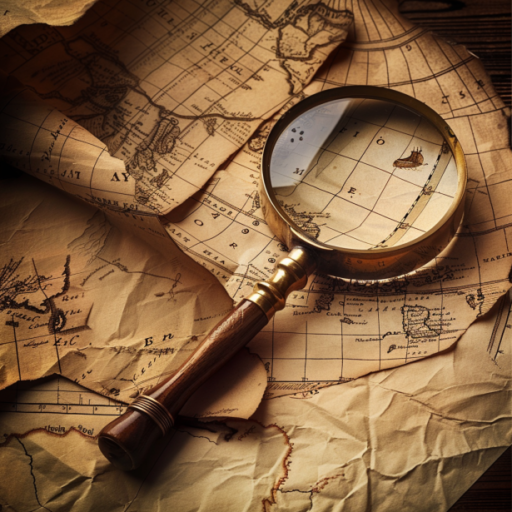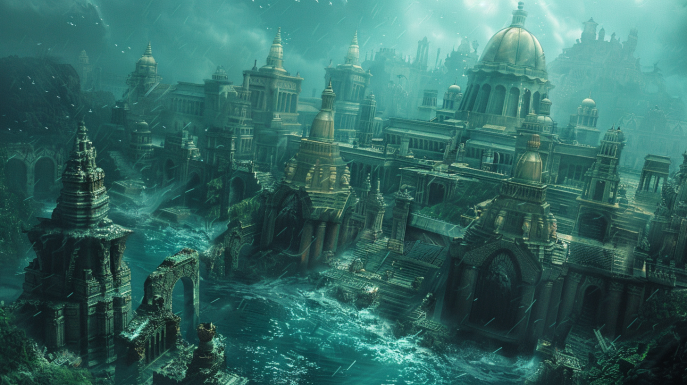Introduction
The legend of Atlantis, a powerful and advanced civilization that supposedly sank into the ocean, has captivated imaginations for centuries. First described by the ancient Greek philosopher Plato, Atlantis is a tale of grandeur and mystery that has inspired countless theories and explorations. But what truly happened to this fabled city? Despite numerous theories and searches, the existence and location of Atlantis remain unproven.
Plato’s Description of Atlantis
Plato is the primary source of the Atlantis legend, mentioning it in his dialogues “Timaeus” and “Critias.” According to Plato, Atlantis was an island nation situated beyond the “Pillars of Hercules” (now known as the Strait of Gibraltar). He described it as a utopian society with advanced technology, magnificent architecture, and a powerful navy.
The Story of Atlantis
Plato’s narrative details the rise of Atlantis, its imperial conquests, and its eventual downfall. The civilization allegedly met its end around 9,600 BCE, succumbing to a cataclysmic event that caused the island to sink into the ocean “in a single day and night of misfortune.” This dramatic demise has fueled endless speculation and debate.
Historical Context
Plato’s account places Atlantis in a time period long before his own, linking it to the era of early human civilizations. Some researchers draw parallels between Atlantis and known ancient cultures, suggesting that Plato’s story might be rooted in historical events, albeit exaggerated or allegorized.
Theories About the Location of Atlantis
Various theories have been proposed regarding the possible location of Atlantis. These range from plausible suggestions within the Mediterranean to more speculative ideas across the globe.
Mediterranean Hypotheses
The Santorini (Thera) Theory: One of the most popular theories is that Atlantis was actually the island of Santorini, which experienced a massive volcanic eruption around 1600 BCE. This eruption could have inspired the story of a sunken civilization.
Crete and the Minoan Civilization: Some believe that the advanced Minoan civilization on Crete, which suffered significant damage from the Santorini eruption and subsequent tsunamis, might have been the basis for the Atlantis legend.
Atlantic Ocean Theories
The Azores and Canary Islands: Some researchers suggest that remnants of Atlantis might be found among the Azores or Canary Islands, where submerged landmasses hint at a possible ancient civilization.
The Caribbean and the Bahamas: Others look to the Caribbean and the Bahamas, where underwater structures like the Bimini Road have sparked speculation about a lost civilization.
Other Proposed Locations
Antarctica Hypothesis: A more unconventional theory posits that Atlantis lies beneath the ice of Antarctica, suggesting that shifting ice could conceal remnants of an ancient culture.
Other Speculative Locations: From the Sahara Desert to the North Sea, various other locations have been proposed, each with its own set of supporting arguments and speculative evidence.
Archaeological Evidence
Archaeological discoveries have provided some support for various theories about Atlantis’ location. However, no definitive evidence has been found that conclusively ties any specific site to Plato’s Atlantis. Artifacts and ruins continue to be analyzed, keeping the debate alive.
Scientific Explanations
Geologists and environmental scientists have explored natural explanations for the Atlantis myth. Catastrophic events like tsunamis, volcanic eruptions, and earthquakes could explain how a civilization might be destroyed and subsequently lost to history. The idea of a sunken continent, while intriguing, remains scientifically unverified.
Myth vs. Reality
The line between myth and reality is often blurred in the case of Atlantis. Plato’s writings, though detailed, are considered by many to be allegorical rather than historical. Separating the mythological elements from potential historical facts is a challenge that researchers continue to face.
Cultural Impact of the Atlantis Legend
The legend of Atlantis has had a profound influence on literature, art, and popular culture. It has inspired numerous books, movies, and documentaries, each adding to the mythos surrounding the lost city. The idea of a hidden, advanced civilization resonates with the human fascination for mystery and discovery.
Continued Search for Atlantis
Modern expeditions and research efforts persist in the quest to find Atlantis. Advances in underwater exploration technology have enabled more detailed searches of suspected sites. While definitive evidence remains elusive, the search itself keeps the legend alive and well.
Debunking Myths and Misconceptions
Many myths and misconceptions about Atlantis have emerged over the years. Critical analysis helps debunk some of the more fantastical claims, emphasizing the need for evidence-based research. Understanding what Atlantis is not can be just as important as exploring what it might be.
Conclusion
The lost city of Atlantis remains one of history’s most enduring mysteries. Despite numerous theories, extensive searches, and technological advancements, its existence and location are still unproven. The legend continues to captivate and inspire, a testament to humanity’s enduring fascination with the unknown.
FAQs
What did Plato say about Atlantis?
Plato described Atlantis as an advanced civilization located beyond the Pillars of Hercules, which sank into the ocean due to a catastrophic event.
Where is Atlantis believed to be located?
Theories about Atlantis’ location include the Mediterranean, the Atlantic Ocean, the Caribbean, and even Antarctica. No definitive site has been confirmed.
Has Atlantis ever been found?
No conclusive evidence has been found to confirm the existence of Atlantis. Numerous searches and studies have yet to yield definitive proof.
Why is Atlantis significant in popular culture?
Atlantis represents the idea of a lost, advanced civilization and has inspired countless stories, theories, and artistic works, making it a cultural icon.
Are there any ongoing searches for Atlantis?
Yes, modern technology and continued interest have led to ongoing searches and research efforts to uncover the truth behind the Atlantis legend.

